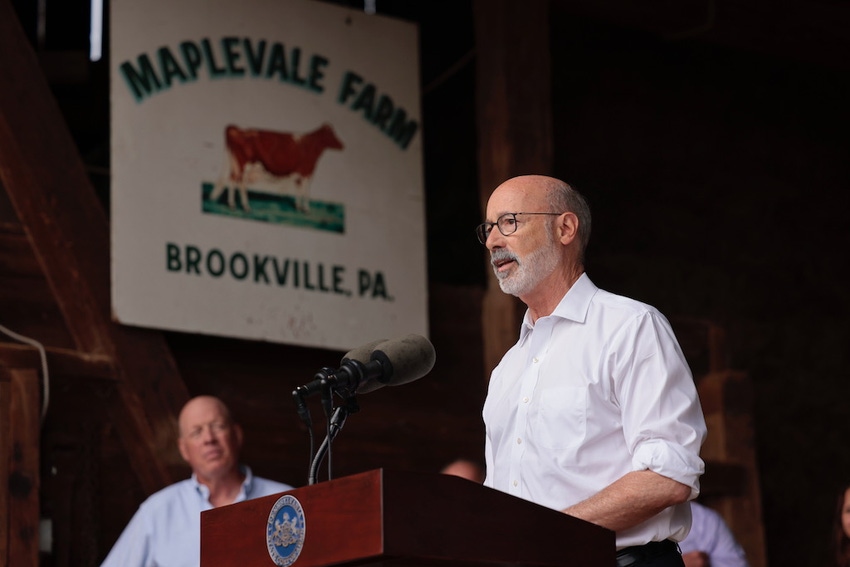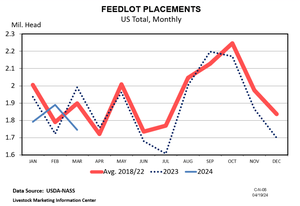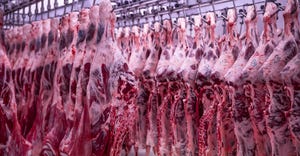Research includes studying impact of vitamin supplements in pregnant sows on piglet health, developing an airway tissue model for evaluating bovine viruses.
September 1, 2022

This week Pennsylvania Governor Tom Wolf announced grants totaling more than $2 million were awarded to six Pennsylvania organizations for research on issues critical to sustaining and growing the state's $132.5 billion agriculture industry. Grant recipients include The Center for Dairy Excellence, Pasa Sustainable Agriculture, Pennsylvania State University, Rodale Institute, Stroud Water Research Institute and University of Pennsylvania School of Veterinary Medicine.
"Investing in research and development helps Pennsylvania battle the effects of climate change and stay on the cutting edge of technology, disease prevention and pest control," said Gov. Wolf. "We are feeding innovation that advances human and animal medicine, and produces cleaner water, healthier soil and a safer, more abundant food supply to sustain our future."
The grants fund a broad range of research aimed at safely controlling spotted lanternfly and other invasive insects; boosting pollinator effectiveness; developing new methods of detecting and preventing animal diseases; building a skilled workforce to sustain growth; and improving soil and water quality through regenerative farming methods.
Grantees, project descriptions and award amounts are listed below:
Center for Dairy Excellence, Harrisburg, Dauphin Co.
Studying implications for dairy farmers of proposed reforms to the federal Milk Marketing Order, the rules surrounding dairy processor milk purchases– $30,000,
Pasa Sustainable Agriculture – Berks County
Supporting farmers in setting management goals for improving soil health and measuring resulting improvements — $135,000
Pennsylvania State University, State College, Centre Co.
Ag Resource Centers – $300,000
Center for Agricultural Law – $100,000
Mitigating spotted lanternfly damage through biological control with endemic insect predators – $64,000
Developing methods of detection and diagnosis of complex bacterial respiratory pathogens in poultry — $18,249
Studying the impact of recently banned antibiotics on antibiotic-resistant bacteria — $22,124
Developing an airway tissue model for isolating and evaluating bovine viruses — $19,146
Tracing viral infections in sheep and goats through complex nucleotide sequences — $20,000
Assessing whether anti-inflammatory treatment prior to birth improves colostrum quality and calf health — $14,754
Assessing the effect of feed additives poultry health and productivity — $40,754
Applied research on the impact of vitamin supplements in pregnant sows on piglet health — $63,892
Investigating Cache Valley Virus and the frequency of related abortions in sheep and goats — $26,245
Expanding the use of new integrated pest management to control phorid flies in mushroom production — $126,718
Exploring effectiveness of a tiny parasitic wasp species as a natural enemy of spotted wing drosophila, an insect that destroys berries and grapes — $66,775
Assessing the shortage of affordable housing and the extent of its impact on agricultural labor — $43,101
Measuring erosion and water quality in Halfmoon Creek in Centre County — $175,000
Determining the impact of insect pests on hemp crops — $53,298
Measuring the impact of organic soil amendments on plant absorption of lead in urban soil — $74,507
Establishing the best crop management methods to encourage mason bee pollination in fruit orchards — $31,413
Rodale Institute, Berks County
Preparing a skilled agriculture workforce and fostering understanding of sustainable, regenerative farming methods — $500,000
Stroud Water Research Center, Chester County
Measuring the impact of agricultural restoration practices on water quality in Lancaster County streams in the Chesapeake Bay watershed — $85,000
University of Pennsylvania School of Veterinary Medicine, Philadelphia
Developing methods of measuring and predicting methane emissions from dairy cows — $57,500
Studying the effect of dietary zinc supplements on the health of dairy cows and calves – $31,114
Developing a method to measure per- and polyfluoroalkyl substances (PFAS) in bovine serum and milk — $23,406
Refining methods of detecting chronic wasting disease by odor in deer feces — $65,001
Source: Office of Governor Tom Wolf, which is solely responsible for the information provided, and wholly owns the information. Informa Business Media and all its subsidiaries are not responsible for any of the content contained in this information asset.
You May Also Like



